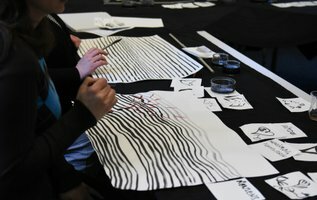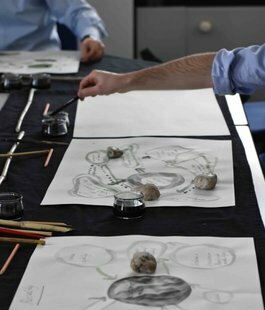Workshops - guided tours
artistic research
The practical implementation of Amikejo starts with the research about regions and their characteristics. Then Peschke makes a creative travel report as a preparation for her workshops. The intention within the workshops or tour groups is a crystallisation of the different kinds of values. Which values are important to me and how do they accompany me in my daily life?
Workshop as a dialogical assistance
Valeska Peschke is convinced that every person can be creative and is able to use creative means of expression in order to connect with ones own inner feelings, ideas and values. Having in mind a general question, it can be expressed by an artistic form whereby it then can be verbalized and truly realized. Hence, art is necessary for knowledge production about ones own values and meanings in life and by means of this, a person can develop and strength its identity more thoroughly. Peschke appears as a so called obstetrician; her task can be compared with Socrates’ “maieutics” (from Ancient Greek, meaning midwives art) and is also known as elenctic method or Socratic debate. Maieutics is a dialectical method, stimulating critical thinking and intending further understanding without actually teaching certain theories. It is a way of helping a person to gain knowledge by itself, so the person “gives birth to its own recognition”. Therefore, Peschke offers dialogical assistance so that people themselves are able to create knowledge.
Traveling with Mental Maps

While Socrates intended a linguistic dialogue, the artist Valeska Peschke works with mental maps, which represent so called “value-landscapes” and are aiming to create knowledge. Mental maps originally come from psychology and deal with individual perception of places and purely spatial and logically imaginable relations. Thus, these cognitive landscapes or mental maps ought to represent our complex perceived spatial reality in a graphical way. Charles Taylor uses the term moral landscape or moral framework which contains individual meanings and values of one’s life. By creating these mental maps we create room for appearance and articulation of our values. Mental maps refer not only to physical room and morality. Furthermore, they are also used in the fields of technology and economy since they offer the possibility of pattern recognition of human’s perception and acting. Due to Big Data, behavioural forecasting and reality mining a multiple integrated landscape of analysis, forecasts and calculated results arises. With pattern recognition actions as well as humans behaviour in general can be easily predicted and eventually also influenced.
Literature:
1 Christoph Kniest: Sokrates zur Einführung. Hamburg: Junius Verlag 2004.
2 Christoph Horn, Christof Rapp (Hg.): "Wörterbuch der antiken Philosophie". C. H. Beck Verlag 2008.
3 Charles Taylor: Quellen des Selbst. Die Entstehung der neuzeitlichen Identität. Übers. v. Joachim Schulte. Frankfurt am Main: Suhrkamp Verlag 1996.
Copyright © All Rights Reserved Idea & Concept & Art by Valeska Peschke, Berlin 2017
